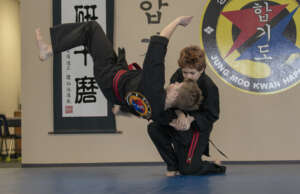Teen Martial Arts
Discover Yourself – Strength of body – Peace of Mind – Calmness of Spirit


Extremely effective self-defense, Physical and Mental Fitness and most importantly, Positive Character, are some of the benefits of training in our Teen Martial Arts program. Students in our Teen Martial Arts program learn to apply positive tenets that they learn, to their everyday lives. Teens who begin HAPKIDO find themselves looking at life challenges as opportunities, rather than obstacles. They become more resilient, and are better able to face the stressors of everyday life. Teens who study Jung Moo Hapkido celebrate their successes in training. They therefore learn to celebrate themselves in life. They become calmer and more confident which leads to competency and a feeling of self-worth.
Participating in healthy, vigorous physical activity helps combat the dangerous trend of childhood obesity. Therefore it helps guard against the resulting diseases like diabetes and high blood pressure for Adults. Regular sports such as baseball, soccer, football and basketball may provide some relief on a seasonal basis. Martial arts, however, are a year-round, healthy fitness commitment that provides a full-body workout. Hapkido training provides strength and flexibility exercises to keep Teens healthy. They are better prepared to succeed in school, at work and at home.
Organized sports are competitive by nature and the focus is always on being better than someone else. In Martial Arts the focus is on being a better YOU! The person you see in the mirror is the toughest opponent you will ever face. Hapkido will remove the “I Can’t” from your teens vocabulary and replace it with “I CAN”.


